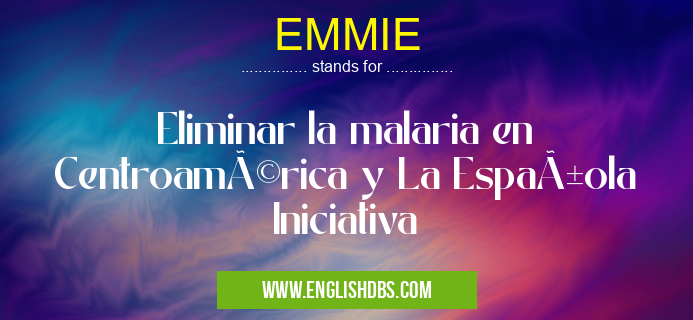What does EMMIE mean in UNITED NATIONS
EMMIE stands for Eliminar la malaria en Centroamérica y La Española, which translates to "Eliminating Malaria in Central America and Hispaniola." It's an initiative launched by the Central American Health Organization (CCAS) and the Pan American Health Organization (PAHO) to eradicate malaria from the region.

EMMIE meaning in United Nations in Governmental
EMMIE mostly used in an acronym United Nations in Category Governmental that means Eliminar la malaria en Centroamérica y La Española Iniciativa
Shorthand: EMMIE,
Full Form: Eliminar la malaria en Centroamérica y La Española
Iniciativa
For more information of "Eliminar la malaria en Centroamérica y La Española Iniciativa", see the section below.
Objectives
- Reduce Malaria Cases: Aiming to reduce malaria cases by 90% by 2025 and achieve elimination by 2030.
- Strengthen Surveillance and Response: Enhancing surveillance systems to detect and respond to malaria outbreaks promptly.
- Improve Access to Treatment and Prevention: Expanding access to effective antimalarial drugs, insecticide-treated bed nets, and other preventive measures.
- Foster Collaboration: Promoting collaboration among countries, regional organizations, and other stakeholders.
Strategies
- Vector Control: Using insecticide-treated bed nets, indoor residual spraying, and environmental management to control mosquito populations.
- Case Management: Providing prompt and effective treatment to infected individuals to prevent severe illness and transmission.
- Surveillance and Response: Implementing robust surveillance systems to monitor malaria cases, identify transmission hotspots, and respond rapidly to outbreaks.
- Health Education and Communication: Raising awareness about malaria prevention and control measures among communities.
Implementation
EMMIE is being implemented in Belize, Costa Rica, the Dominican Republic, El Salvador, Guatemala, Honduras, Nicaragua, and Panama. The initiative has received funding from the Global Fund to Fight AIDS, Tuberculosis and Malaria.
Essential Questions and Answers on Eliminar la malaria en Centroamérica y La Española Iniciativa in "GOVERNMENTAL»UN"
What is the EMMIE Initiative?
EMMIE (Eliminar la Malaria en Centroamérica y La Española) is an initiative launched in 2021 by the Central American Integration System (SICA) and the Pan American Health Organization (PAHO) to eliminate malaria transmission in Central America and the Dominican Republic.
Which countries are included in the EMMIE Initiative?
The EMMIE Initiative includes seven countries: Belize, Costa Rica, the Dominican Republic, El Salvador, Guatemala, Honduras, and Nicaragua.
What is the goal of the EMMIE Initiative?
The goal of the EMMIE Initiative is to achieve zero indigenous cases of malaria transmission in Central America and the Dominican Republic by 2030.
What strategies are being used to achieve the goal of the EMMIE Initiative?
The EMMIE Initiative employs a multi-pronged approach, including:
- Strengthening surveillance and early detection systems
- Increasing access to effective antimalarial treatments
- Implementing vector control measures, such as insecticide-treated mosquito nets and indoor residual spraying
- Promoting behavioral change for malaria prevention
- Engaging communities in the fight against malaria
What are the expected benefits of the EMMIE Initiative?
The expected benefits of the EMMIE Initiative include:
- Reduced malaria-related morbidity and mortality
- Improved health outcomes for affected populations
- Economic savings through reduced healthcare costs and increased productivity
- Improved quality of life for communities
How can individuals support the EMMIE Initiative?
Individuals can support the EMMIE Initiative by:
- Raising awareness about malaria and its prevention
- Donating to organizations supporting malaria elimination efforts
- Volunteering with local organizations involved in malaria control
- Adopting preventive measures against mosquito bites, such as using insect repellent and wearing protective clothing
Final Words: EMMIE plays a critical role in the fight against malaria in Central America and Hispaniola. By implementing comprehensive strategies, including vector control, case management, surveillance, and health education, the initiative aims to eliminate malaria from the region and improve the health and well-being of its population.
